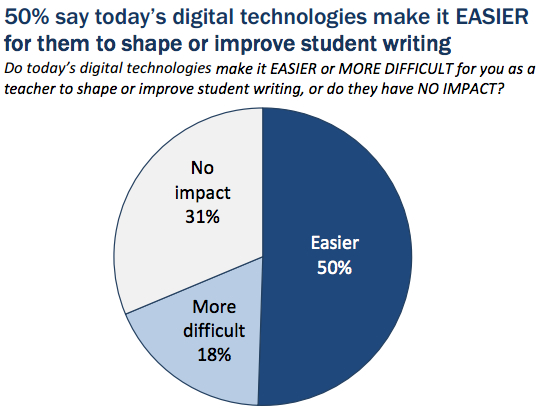Technology in Education Can Overcome Writing Deficiencies it Created

 Credit: Monkey Business Images / Shutterstock.com
Credit: Monkey Business Images / Shutterstock.com
A perpetual discussion in education policy is the role of tech tools in the classroom. Some districts invest in technology through costly bond measures. Some schools have made it work and have integrated tech well into instruction.
A study done by the Pew Research Center revealed that while digital tools in education can complement instruction, it has also shaped what needs to be taught in writing. Teachers still value the art of formal writing and tech-minded students may have new ways to think critically. But a generation growing up with the informalities of social networking and text messages presents new challenges for instruction.
The most important findings that highlighted the benefits of digital tools and teaching reveal:
1) 96% agree (including 52% who strongly agree) that digital technologies “allow students to share their work with a wider and more varied audience”2) 79% agree (23% strongly agree) that these tools “encourage greater collaboration among students”3) 78% agree (26% strongly agree) that digital technologies “encourage student creativity and personal expression”
However, carelessness and informalities permeate the educational realm as student grow up with new tech:
1) 68% say that digital tools make students more likely—as opposed to less likely or having no impact—to take shortcuts and not put effort into their writing2) 46% say these tools make students more likely to “write too fast and be careless”3) Yet, while 40% say today’s digital technologies make students more likely to “use poor spelling and grammar” another 38% say they make students LESS likely to do thisSource: The Pew Research Center's Internet & American Life Project Online
Pew's study is rooted in a survey of teachers based on a non-representative sample of 2,067 middle and high school teachers.
Pew's research sheds new light to the debate on the changing role of teachers with technological advances. Much of the conversations cover how online courses could replace college professors or how investing in tech tools have changed school budget priorities. Added to the discussion will be how not only does tech overcome academic deficiencies, but how it also creates new ones.
(The entire Pew study "Impact of Digital Tools on Student Writing and How Writing is Taught in Schools" can be read and downloaded here.)




